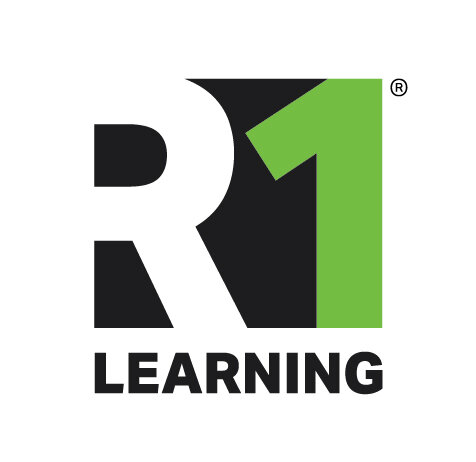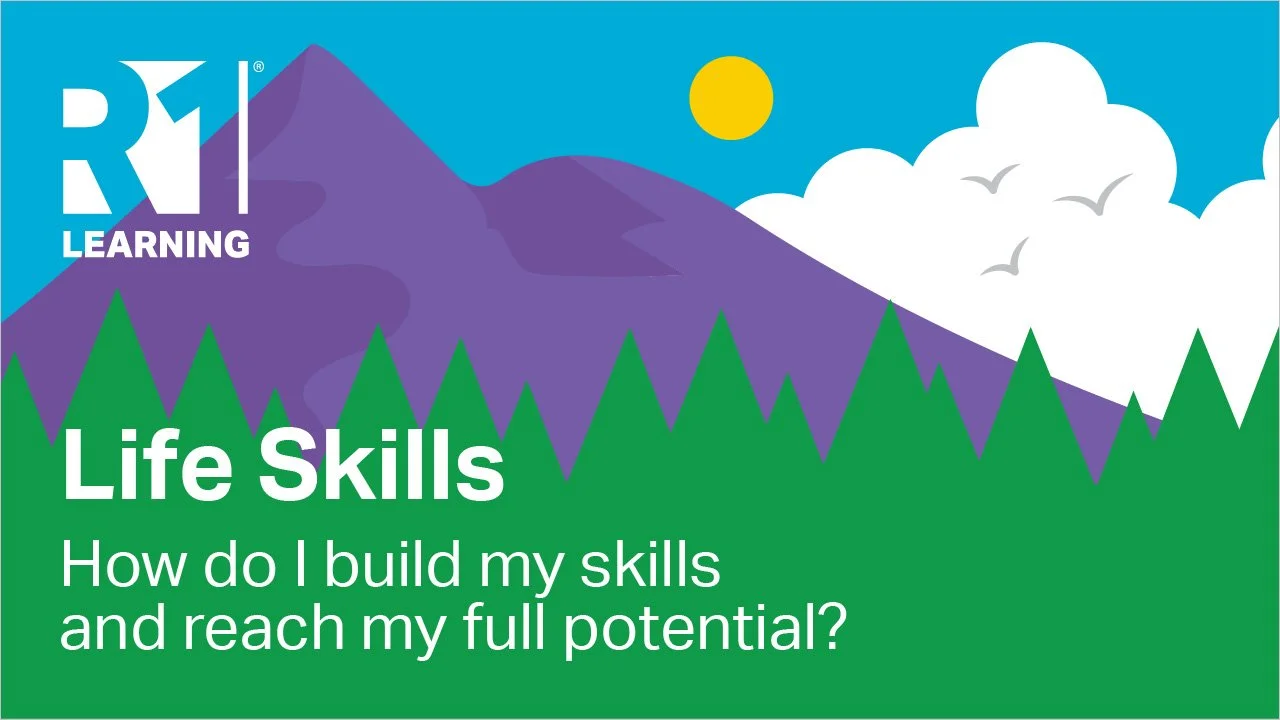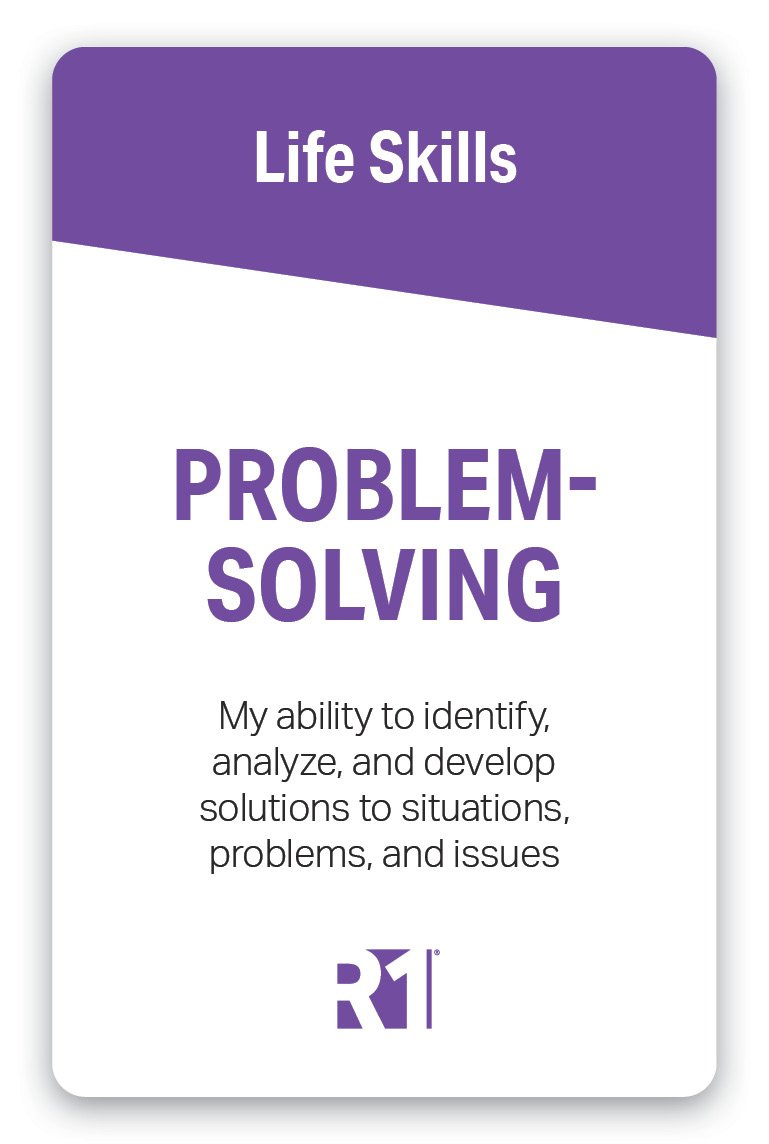14 Life Skill Types — How Do I Build My Skills & Reach My Full Potential?
Life Skills may turn out to be the most impactful topic in the R1 Learning System over time. When I first started R1, several practitioners along our early path asked me if we had a Life Skills topic. At the time, being new to the behavioral health field, I didn’t fully comprehend the question. In my mind they were asking about separate topics that we had already identified on our roadmap such as Values, Career Interest, Communication, and Financial Fundamentals. As I have moved along the R1 path and learned more, my thinking on this topic has evolved. Today I see this topic very differently, especially given the 14 Life Skill Types you’ll see today. This is a topic that we will customize on R1 Discover for different communities, programs, populations, and settings. Depending on the needs of the population being served, the Life Skill Types may differ in both number and types. With its practicality and simplicity, this topic will increase engagement, self-awareness, exploration, SMART Goal setting, and skill building. The purpose of today’s post is to introduce you to our new Life Skills topic and get your feedback. It is always helpful to hear from you—our early adopters, followers, and customers worldwide. All feedback, thoughts, and ideas are welcomed. Please share via our Contact Us. We look forward to hearing from you.
Definition: Life skills are a group of psychosocial competencies and interpersonal skills that help people manage their lives in a healthy and productive manner. The World Health Organization (WHO) defines life skills as the abilities for adaptive and positive behavior that enable individuals to deal effectively with the demands and challenges of everyday life. Life skills have been classified into three broad categories:
▪ Thinking skills: Thinking skills are the skills that enhance the logical faculty of the brain using an analytical ability, thinking creatively and critically, and developing problem-solving skills and improving decision-making abilities.
▪ Social skills: Social skills include interpersonal skills, communication skills, leadership skills, management skills, advocacy skills, co-operation and team building skills, etc.
▪ Emotional skills: Emotional skills, involves, knowing and being comfortable with oneself. Thus, self–management, including managing/coping with feelings, emotions, stress and resisting peer and family pressure.
Life skills development enables individuals to build and maintain the skills that lead to greater autonomy and independence. The ability to manage daily responsibilities, such as time management and organizational skills, equips individuals to take control of their personal lives, contributing to a sense of achievement and self-reliance. When individuals master these essential skills, they are better prepared to handle everyday tasks without needing external assistance, which is a critical aspect of personal independence. Developing life skills is essential for building resilience and independence in individuals. These foundational skills not only prepare people to navigate the complexities of daily life but also empower them to lead fulfilling, autonomous lives. By fostering personal competence and social connectedness, life skills development enhances overall well-being and equips individuals with the tools needed to thrive in an ever-changing world.
Explore R1 Discover — Interactive Engagement Tools
Life Skills Defined
The 14 Life Skill Types Defined
The 14 Life Skill Types are listed below. For each, you will find a brief definition, examples of the Discovery Card’s behavioral statements, and Questions to Explore. Please note that all of this information, and more, is listed in the Life Skills Topic Kit (which includes 1 Discovery Cards deck and 1 Facilitator Guide) located on the R1 Store.
Anger Management: My ability to recognize, prevent, and regulate my emotion of anger
Discovery Cards Examples:
I am aware of what makes me angry (e.g., thoughts, beliefs, environments)
I know how to calm myself when I get frustrated or mad (e.g., play music, go for a walk, read)
Questions To Explore Example:
What makes you mad? Explain. What is your intensity level when you are angry?
How do you avoid people, places, things, or situations that make you angry?
Assertiveness: My ability to express my needs in a calm, direct, and respectful manner
Discovery Cards Examples:
I calmly speak up when I need something
I am able to say "no" to others
Questions To Explore Example:
How do you assert yourself? What makes you think you are effective? Explain.
How does it make you feel when you are able to say "no" to others?
Communication: My ability to effectively communicate with others through verbal, written, or sign language
Discovery Cards Examples:
I communicate effectively with others (e.g., timely, directly, clearly, concisely)
I communicate in an honest and respectful way
Questions To Explore Example:
How do you know that others feel heard
Where and when did you learn to read and write?
Community Resource Use: My ability to identify and utilize community resources and informal supports
Discovery Cards Examples:
I know what community resources are available for me and my family
I know who to contact for help in my community
Questions To Explore Example:
What are some of the community resources you have access to? How did you find them?
Who will you call in case of an emergency? Do you know how to contact them for help?
Daily Responsibilities Management: My ability to organize, prioritize, and complete daily tasks and obligations in a timely manner
Discovery Cards Examples:
I pay my bills or turn in my homework on-time
I clean and maintain my living space daily
Questions To Explore Example:
What helps you to get to work or school on-time? What stops you?
What are you doing or not doing to take care of your hygiene?
Independent Living: My ability to set and manage daily tasks and responsibilities independently
Discovery Cards Examples:
I have reliable transportation (e.g., bike, vehicle, bus, train)
I eat healthy, filling, and nutritious foods daily (e.g., buy, obtain, prepare, cook, store)
Questions To Explore Example:
How often to you visit the doctor or dentist? Where do you go for your medical care?
What are your sources of income? What do you do for work? How long have you worked there?
Leisure Time Use: My ability to identify and participate in productive and meaningful leisure time activities
Discovery Cards Examples:
I participate in meaningful leisure time activities
I know what positive activities I like to do with my leisure time
Questions To Explore Example:
What are some of your favorite leisure activities? What makes them meaningful for you?
Describe some positive things you do with your leisure time?
Medication Management: My ability to organize, administer, and monitor my compliance with taking prescribed medication
Discovery Cards Examples:
I know what medications I take and what they are for
I take my medications as prescribed (e.g., dose, time of day, frequency)
Questions To Explore Example:
Who do you call or what do you do if you feel sick from your medications?
How do you manage your medications so that you take them timely?
Mental Health Management: My ability to recognize and manage my mental health and wellness
Discovery Cards Examples:
I am aware of my mental health needs (e.g., anxiety, depression, trauma)
I know how to regulate my emotions using healthy coping skills
Questions To Explore Example:
What is your top mental health need? How are you addressing it today?
Where do you get help for your mental health needs?
Problem Solving: My ability to identify, analyze, and develop solutions to situations, problems, and issues
Discovery Cards Examples:
I ask for help if I can't solve a problem on my own
I slow down or pause when I run into a problem
Questions To Explore Example:
Who do you turn to for help when you can't solve a problem?
What helps you to be flexible and adaptable when you are learning something new?
Prosocial: My ability to interact with others in a positive, cooperative, and respectful manner
Discovery Cards Examples:
I show kindness and empathy towards others
I cooperate with others at work and play
Questions To Explore Example:
How do you comfort others? Where did you learn this? Who was a model for you?
What are some of the positive aspects of how you connect with others. Explain or give an example.
Social Networks Building: My ability to establish, maintain, and expand my relationships and connections with others
Discovery Cards Examples:
I belong to a group of friends that make me feel safe
I have an intimate friend or partner that supports me
Questions To Explore Example:
Who are some of your closest friends? What makes your relationships meaningful?
Who supports you emotionally? What do they do for you that is helpful?
Stress Management: My ability to recognize and reduce my physical and emotional stress
Discovery Cards Examples:
I avoid stressful people, places, things, and situations
I know what makes me stressed and how it affects me
Questions To Explore Example:
What are some of the things that make you stressed? How do each affect you?
How do you calm yourself when you get stressed?
Substance Use Management: My ability to prevent or address the harmful impact of substance use (drinking alcohol or use of illegal drugs or prescribed medications for purposes other than intended)
Discovery Cards Examples:
I understand the harmful effects of substance use (e.g., physical, psychological, social)
I know what resources are available to me and others when substance use is a problem
Questions To Explore Example:
Where do you turn to for help with problematic substance use?
What are some of the consequences or harmful effects of your substance use?
A Toolkit For Engagement — What’s In the Deck
Questions to Explore
Answer the following questions for yourself or with your team:
What do you find most helpful about the Life Skills Model and 14 Life Skill Types?
Which of the Life Skill Types will be most useful for you and/or your team as you work with individuals in your program?
How will your knowledge of the 14 Life Skill Types help you to better understand the needs and strengths of the individuals you work with?
How can you use this information to engage and support individuals in your environment toward skill building?
What additional tools or resources do you have to support skill building in each of the 14 Life Skill Types?
What will be the benefit for you and others as you use this topic to identify strengths and areas for growth?
What is your major learning or takeaway from the post? Explain.
Thank you for reading this post and participating in this activity. Contact us if you would like to learn more about the Life Skills topic and the R1 Learning System. We look forward to hearing from you.
References
World Health Organization. Life skills education: planning for research as an integral part of life skills education development, implementation and maintenance. Geneva: World Health Organization; 1996. Available from: https://iris.who.int/handle/10665/338491
World Health Organization, Mental Health Determinants and Populations Team. Working with street children: a training package on substance abuse, sexual and reproductive health including HIV/ AIDS and STDs. Geneva: World Health Organization; 2000. Available from: https://iris.who.int/handle/ 10665/66756
Texas Health and Human Services Commission. Provider appeals and reviews: Rule §354.2217. Texas Administrative Code. 2003. Available from: https://texreg.sos.state.tx.us/ public/readtac$ext.TacPage?sl=R&app=9&p_dir=&p_rloc=&p_tloc=&p_ploc=&pg=1&p_ tac=&ti=1&pt=15&ch=354&rl=2217
Prajapati R, Sharma B, Sharma D. Significance of Life Skills Education. Contemporary Issues in Education Research (CIER). 2016; 10(1):1-6. Available from: HYPERLINK “http://dx.doi.org/10.19030/ cier.v10i1.9875”10.19030/cier.v10i1.9875
Copyright 2025 R1 Publishing LLC / All Rights Reserved. Use of this article for any purpose is prohibited without permission.
A Special “Thank You” from R1!
R1 expresses our deepest gratitude to Aspire, Thrive, Overcome LLC for their partnership with R1’s Life Skill topic. Thank you Jon Nathaniel Ford for your partnership with R1 Learning. Your leadership and passion for individuals, families, and communities are inspiring. To Denise Zimmermann, this topic would not exist without your experience, passion, and talents. Your contribution to the field and this topic in particular will serve individuals, families, and communities for years to come. Without your help, intellectual capital, and collaborative support this would not have been possible.
Engagement Tools
Integrating Discovery Card activities into your groups and one-on-ones will allow individuals to think concretely, increase self-awareness, build vocabulary, express themselves more effectively, and put insights into action. Visit the R1 Store to learn more about these evidence-based topics and models.
Here are a few ideas to help you learn more about R1 and engage others on this topic:
Share this blog post with others. (Thank you!)
Start a conversation with your team. Bring this information to your next team meeting or share it with your supervisor. Change starts in conversations. Good luck! Let us know how it goes.
Visit www.R1LEARNING.com to learn more about R1, the Discovery Cards, and how we’re creating engaging learning experiences through self-discovery.





























